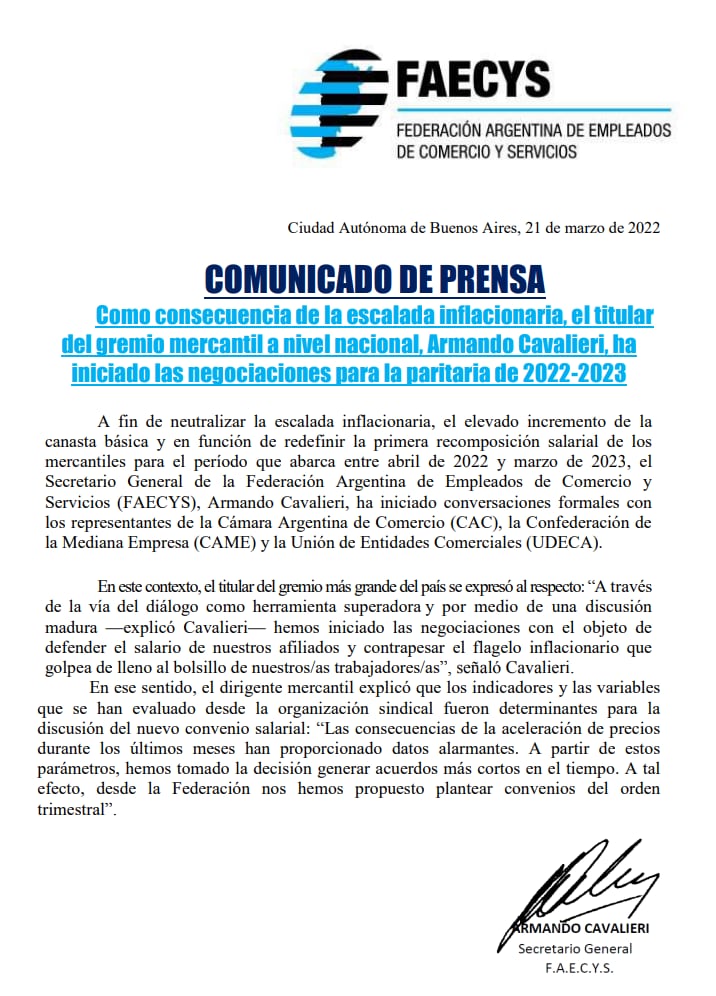
A few days after President Alberto Fernández announced the beginning of the “war against inflation”, the Argentine Federation of Trade and Service Employees (Faecys) began joint negotiations for the period 2022-2023 on Monday and is the first union to seek quarterly reviews this year” as a result of the escalation” in prices.
According to what the leader of this union, Armando Cavalieri, explained, the formal dialogue with the Argentine Chamber of Commerce (CAC), the Confederation of Medium Enterprises (CAME) and the Union of Commercial Entities (Udeca) seeks to “neutralize the escalation of inflation and the high increase in the basic basket”.

For this reason, the union and the organizations that bring together entrepreneurs decided to start negotiations to “redefine the first wage recomposition of the mercantiles” corresponding to the deadline that runs from April this year to March next.
“Through dialogue as an overcoming tool and mature discussion, negotiations began to defend the salary of the members and to counterbalance the inflationary scourge that hits the pocket hard,” Cavalieri said.
The union leader argued that the indicators and variables evaluated by the union he leads “were decisive for the discussion of the new wage agreement.” He emphasized that “the consequences of the price acceleration over the past few months provided alarming data and, based on these parameters, the decision was taken to generate shorter agreements, that is, of the quarterly order.”
This is a clause that so far has only the Union of Automotive Transport Mechanics and Allied Workers (SMATA), a union that is significantly smaller in membership than Faecys, which is the first large union to demand this year, signed by the “inflation war” called by the Alberto Fernández government.
As Infobae anticipated, the Government seeks to bring the salary cap that emerges from the 2022 wage negotiations to be around 45%, which is exactly the figure agreed last week by the metallurgical union with the employers of the sector, so the official expectation is that this will be a “joint witness”.
However, in the face of annual inflation that would reach 60%, according to estimates, it is possible that some unions may break this ceiling that the Executive Branch intends to impose, as did the Toll Union, whose deputy secretary is Facundo Moyano, a critic of the Front of All who closed a salary review that reached the 58% and will be reopened in June to negotiate the new agreement.
Just a month ago, the federation that brings together the mercantiles and the business chambers of the activity agreed to an annual increase in wage equity of 54% over the basic agreement for the period April 2021-March 2022, which implied raising the income floor to $90,000, according to the Ministry of Labor.
The increase was sealed in the Ministry of Labour before its head, Claudio Moroni, between Faecys and the business representatives of the Argentine Chamber of Commerce (CAC), the Argentine Confederation of Medium Enterprises (CAME) and the Union of Argentine Commercial Entities (UDECA).
In this way, employees in the sector received a 13% increase in wages in two tranches: the first, 3%, in February and the other 10% that they already received in March.
“The agreement will make it possible to overcome the serious consequences of price remarking, inflation and the high cost of living in a harsh social context. Faecys has a deep commitment and responsibility to the 1.2 million commercial workers and took on countless efforts to safeguard employment and counter the inflation gap,” Cavalieri said at the time.
Thus, “the salary floor was thus raised from 74,733 to 90,000 pesos, including the presenteeism item”, after which the union leader thanked the employers chambers for “the effort and willingness demonstrated in a difficult context” and pondered “dialogue”.
KEEP READING:
Últimas Noticias
Debanhi Escobar: they secured the motel where she was found lifeless in a cistern
Members of the Specialized Prosecutor's Office in Nuevo León secured the Nueva Castilla Motel as part of the investigations into the case

The oldest person in the world died at the age of 119
Kane Tanaka lived in Japan. She was born six months earlier than George Orwell, the same year that the Wright brothers first flew, and Marie Curie became the first woman to win a Nobel Prize

Macabre find in CDMX: they left a body bagged and tied in a taxi
The body was left in the back seats of the car. It was covered with black bags and tied with industrial tape
The eagles of America will face Manchester City in a duel of legends. Here are the details
The top Mexican football champion will play a match with Pep Guardiola's squad in the Lone Star Cup

Why is it good to bring dogs out to know the world when they are puppies
A so-called protection against the spread of diseases threatens the integral development of dogs




